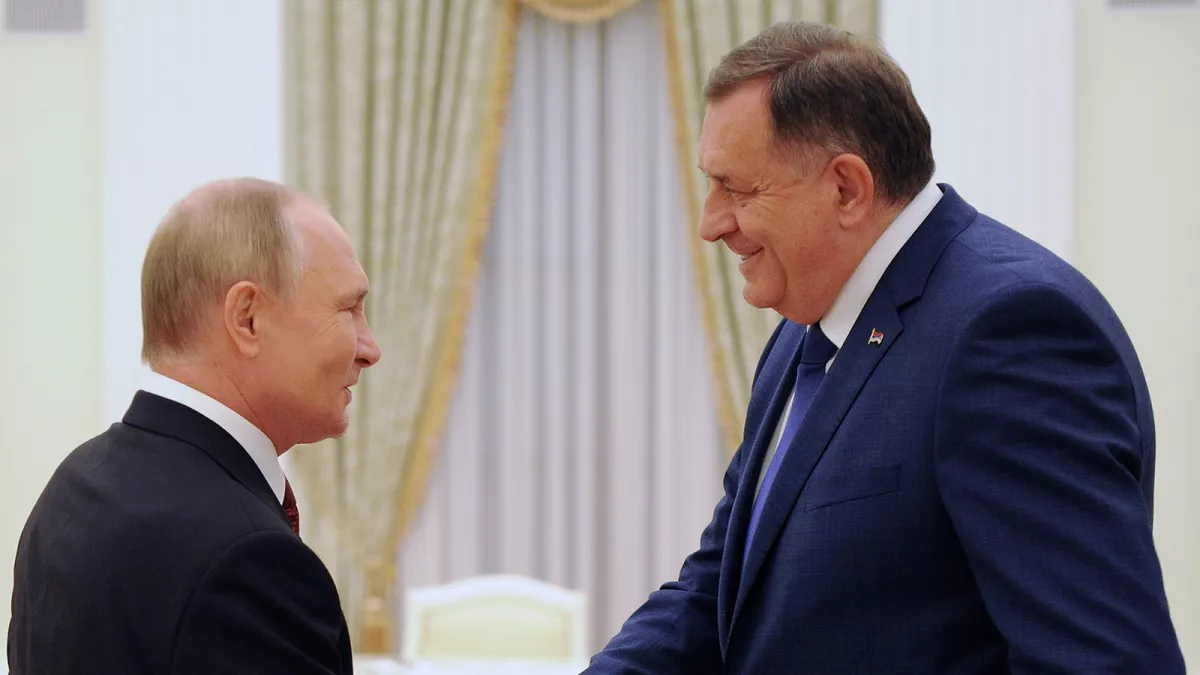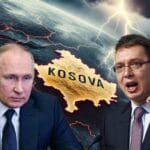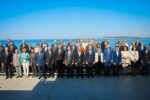It turned out that the nationalists are false patriots, they hardly waited for the first opportunity to betray their own country and people, and those who were slandered as anti-Serb, non-national elements – internationalists and communists – fought against the occupiers. The latter managed to defeat the fascists and their helpers, so they kept nationalism on a chain for half a century, as long as they could. Then came the restoration and construction of the nationalist evil spirit, and the old good practice of slaughtering other peoples and occasionally killing innocent members of one’s own nation was also renewed.
Serbian patriotism is a strange feeling that has several stages of development. In the beginning, patriotism is manifested by a pounding in the chest, by defying the world powers that would subjugate our small libertarian nation, by insisting on absolute sovereignty and a firm determination to be ourselves in our own way. Hatred of other nations and domestic traitors is self-evident, without these ingredients there is no true patriotism, which is logical for an irrational emotion based on the exclusion of others and the different, and on the suppression of the human personality and its inviolable freedom.
In the second phase, in a seemingly paradoxical twist, virtuous Serbian patriots look for a foreign master to serve, glorify a powerful totalitarian country, develop a cult of the leader of another nation, and entangle themselves in servility and servitude. This is how it happens that little by little, almost imperceptibly, the greatest among the great Serbs become the servants of some White World dictators and villains, quislings and collaborationists.
Guardians of a healthy national spirit
Such a reversal happened to Serbian nationalists and patriots at least twice in the last hundred years. For the first time, this seemingly unexpected transfer from patriots to quislings occurred during the Second World War. Then the greatest advocates of the national spirit, guardians of the national culture, Serbian name and tradition, such as Vladimir Velmar Janković, Velibor Jonić, Dimitrije Ljotić or Dimitrije Najdanović, became part of the German occupation apparatus. And there was no inconsistency here, the self-proclaimed patriots found themselves among their own, out of a deep ideological conviction.
The guardians of Serbian culture from foreign influences and Western decadence eventually ended up as collaborators of the Nazi occupier. The fate of the literary critic Miloš M. Milošević, known to the general public for his pamphlet against the collection of poems “Otkrovenje” by Rastko Petrović, is typical. Milošević tried with all his might to protect the healthy Serbian spirit from poetry that is “under the direct influence of extreme currents of French art, which is all about decomposition”.
He became so engrossed in patriotic fervour that he declared one of the greatest poets of Serbian literature a “hereditary degenerate” who paints “the state of a psychopath who becomes a sex maniac”, calling him “a characteristic phenomenon from social pathology”, a “neuropath” and a fool. As Marko Ristić testifies, Milošević ended up as a Nazi collaborator, committing suicide in October 1944, while the partisans were liberating Belgrade.
When patriots become collaborators
Ristić also dealt with the phenomenon of the transformation of nationalists into collaborators in the book “Hacer tiempo – records on the margins of the war 1939 – 1945.” The great Serbian surrealist does not see this transformation as an isolated case, it is a phenomenon that spread throughout occupied Europe. Ristić says that he writes that everything that happened between 1918 and 1941 inevitably led to “that betrayal of the nation by the nationalists, which in the whole of occupied Europe came to such shamelessly obvious expression in all the regimes of Quisling, Peten or Nedić, or in a monstrous version of betrayal.” which in our country is symbolized by Draža Mihailović. Nationalists have become defeatists, and internationalists have become patriots”.
For Ristić, the loudest patriots are actually people who “stopped considering the fatherland as something other than a profitable enterprise”, and therefore advocated an opinion that “saw in the occupation the possibility of affirming Serbian nationalism”.
The nationalists proved to be false patriots, they hardly waited for the first opportunity to betray their own country and people, and the occupiers were fought against by those who were slandered as anti-Serb, non-national elements – internationalists and communists. The latter managed to defeat the fascists and their helpers, so they kept nationalism on a chain for half a century, as long as they could. Then came the restoration and construction of the nationalist evil spirit, and the old good practice of slaughtering other peoples and occasionally killing innocent members of one’s own nation was also renewed.
Russian service
Again, patriotic phrasing filled all public space, this unbearable blathering has been going on for thirty-odd years, and almost nothing else can be heard except nationalist cries. Little by little, Serbian nationalists moved into the second phase, turning their eyes towards the Kremlin and Khazjain Vladimir Vladimirovich Putin, whom they saw as a guarantee for the realization of the dream of all-Serbian unification. In the wars of the nineties, not everything went according to plan for them, there was no way they could create a greater Serbia, so now they put all their hopes in the powerful Russian state and its warfare against the evil, decadent West. Their counterparts eight or nine decades ago saw Hitler as the only protection from the pernicious foreign influences on the healthy national fabric, and today’s self-proclaimed patriots seek the same protection from the Kremlin master.
Thus, the great Serbian nationalists have actually become Russian patriots, they compete in worshipping the dictator and criminal Putin, and some of them even openly advocate the idea of Serbia becoming a Russian governorate. The greatest fans of Serbia since it was holy have overnight become the most loyal servants of another country, Russia. This does not prevent them from continuing to look for traitors among the Serbs who do not really like being enslaved by the Russian dictator, and who nevertheless see the future of their country within the framework of the community of European nations.
Nothing else can be expected from a privileged clique that, as Marko Ristić said, does not consider the motherland to be anything other than a profitable enterprise. A team of indomitable national grasshoppers who live comfortably on the backs of their beloved people see in Russia and Putin the only guarantee that such an order will not change, that they will forever be able to rob their own citizens and keep them in poverty, backwardness, at the bottom of Europe.
We have seen it all before, we know it all from history, the main difference is that Putin’s campaign against the Western world and the international order is not going very well, he got stuck at the first step in Ukraine, so there is no hope of creating a great the Russian state “from Lisbon to Vladivostok”. Putin’s Russia proved to be a much weaker aggressor than Hitler’s Third Reich, which prevented local nationalists from showing all their lavish quisling potential.
Loyalty to Mother Russia
Despite the unfavourable development of events on the ground, our Russian colonists still persist in their loyalty to mother Russia and its master. Maybe Putin is not exactly the ideal dictator and employer, but there is no better one in sight, he should be supported now when it is the most difficult for him. It must be admitted that Putin’s lackeys show even some symptoms of unexpected creativity in their servility.
Here, for example, is Milorad Dodik. He awarded Putin the Order of Republika Srpska on a branch on the occasion of the unconstitutional January 9. In his explanation, he stated several common phrases and lies, such as the one that “thanks to the position of Vladimir Putin and the strength of the Russian Federation, the voice and position of Republika Srpska is heard and respected and its position is preserved under the onslaught of international interventionism”.
Putin has had no position since he ordered his army to invade Ukraine and commit war crimes on a daily basis. The Russian president has been labelled a war criminal, is in international isolation, under sanctions and has been seen in The Hague. The Russian Federation is a failed country with no future, at least with this kind of regime whose end is not in sight anytime soon. From this perspective, it is quite logical that Putin received the order that many criminals before him deserved, from Slobodan Milošević and Radovan Karadžić to Vojislav Šešelj, Biljana Plavšić and Ratko Mladić.
Republika Srpska, Putin’s back yard
However, in the explanation, there was also more interesting wording, which says that Putin is to blame for “particularly patriotic concern and love for the Republika Srpska”. Patriotic care and love? How can the president of a foreign country show patriotic feelings towards a part of another country? How did Vladimir Putin become a Serbian or Republika Srpska patriot? No matter how you define patriotism, also known as patriotism, it is clear that it is an affirmative attitude towards one’s homeland, one’s country, one’s fatherland, one’s people or whatever. There is no patriotism that refers to someone else’s country, someone else’s nation, or someone else’s homeland.
A foreign statesman can show care and love for a part of another country, theoretically, but that care and love cannot be patriotic, neither in theory nor in practice. If Putin has some kind of patriotic feelings towards Republika Srpska, as Dodik convinces us, it means that the entity of Bosnia and Herzegovina is part of Russia. Thus, Dodik declared Republika Srpska as Putin’s protege, and himself as the viceroy of the protectorate under Russian occupation, as it were, the Balkan version of Ramzan Kadyrov. That’s where Dodik’s ambitions are thrown. The lessons of history are clear: As soon as the self-proclaimed Serbian patriot opened his suffering soul, a quisling spoke out of him. Especially the one who turned the beloved country into a private enterprise and enriched himself at the expense of subjects living in voluntary slavery.
Source: zurnal.info







